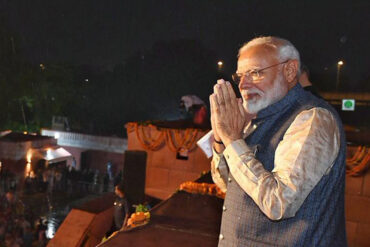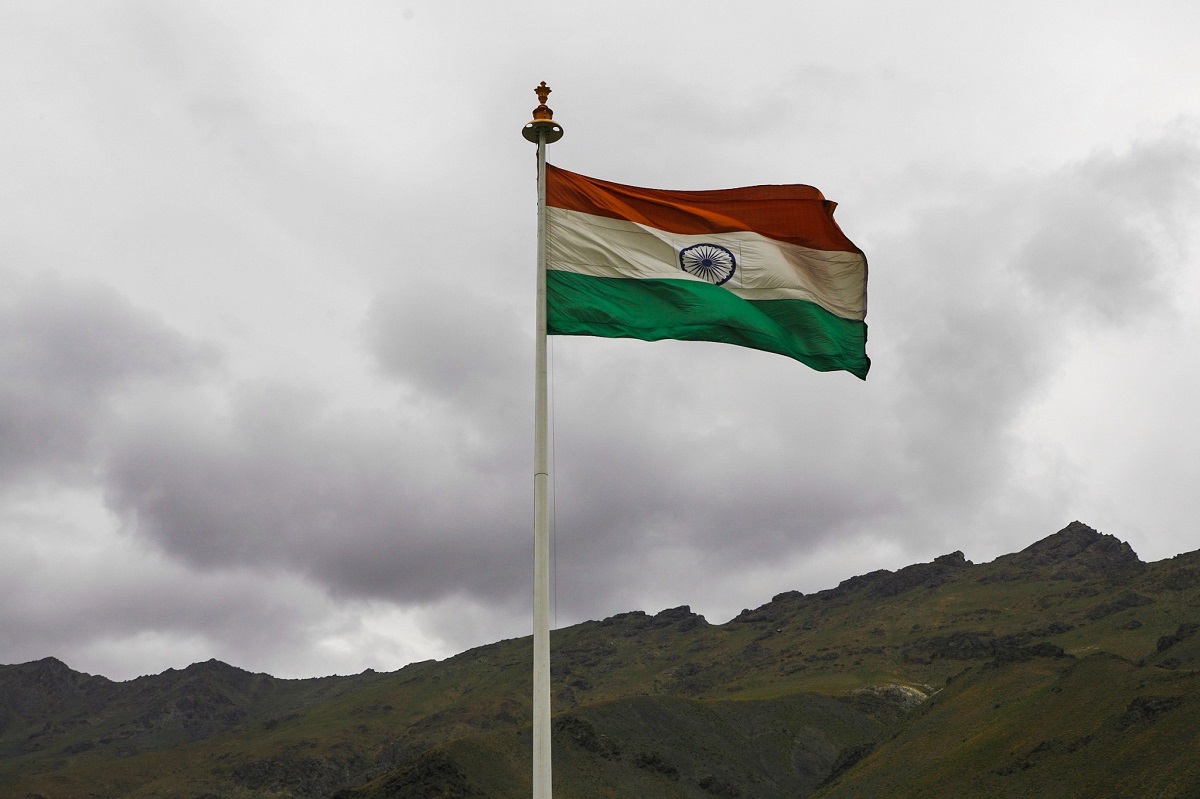News shows these days are theaters of the absurd and sensible viewers must constantly remind themselves that what they are watching is not a clever parody but the real thing, the happening world. Consider this for instance – a group of people calling themselves gau-rakshaks (cow protectors) use such modern technologies like smartphones and the internet to trace and find people they suspect of trafficking beef because they believe the cow to be their mother. They are aided in their efforts by the state police. Meanwhile, trafficking of children and women goes on unabated with nary a nari-rakshak anywhere in sight.
The latest to join this burlesque is the national anthem debate. The Supreme Court has decided to cultivate patriotism in the land by singing the anthem in movie theatres before each show. Citizens are advised to stand during the recital. People who choose to sit are spotted by anthem-rakshaks and arrested by police. The court order has divided movie-goers into four groups- the Joyful Standers (JFS), the Joyless Standers (JLS), the Grim Sitters (GS) and the Cool Shitters (CS). The last are the ones who said, “Oh, shit”, and stopped going to movie halls. The JLS is the most common, followed by the JFS, the CS and the GS in that order.
The Cool Shitters are quiet dissenters. The Grim Sitters are more vocal and wish the world to take note of their dissent. These may also include the occasional alcoholic who cannot be bothered to stand up. The Joyless Standers are those who have no particular opinion one way or the other about the whole rigmarole but feel that they might as well do what is required so that they can watch their movie in peace. The recently concluded IFFK saw such people stand in large numbers before the movies which, ironically, highlighted State intrusion into civilian life. Joyless Standers may disagree with the exercise but do not feel it necessary to press the question. The Joyful Standers are a small group who feel that the court order is right and proper. Within their number is a sub-group, the anthem-rakshaks, who are not content to merely stand. They must make sure that everyone else also stands, and will spare no pain to punish sitters with whatever means at hand – vigilante justice or the more conventional form. The anthem-rakshak interprets dissent as disrespect to the national anthem and seeks to criminalize it.
The basic question asked of Grim Sitters by anthem-rakshaks is, “What is wrong in respecting the national anthem?” This question is usually followed by such sneering accusations as, “Is non-conformism a fashion?”, “So you think you are a global citizen”, and others far worse, of which a printable one is the comment by film actor Maniyan Pilla Raju. Malayalees out of Kerala, Mr. Raju said, obey whatever they are told like dogs, apparently believing this to be a Malayalee problem, which it certainly is not, witness extensive discussions by non-Malayalees on the issue. Another obvious implication of this tasteless comment is that since the Mallu is a dog in foreign climes, he might as well be one in his home as well. Mr. Raju’s comments do not deserve further address.
The question must be addressed, however, and it can be broken down into parts, the asked and the implied. There are three separate issues:
- Should we respect national symbols or icons – the flag, the anthem, the military – at all?
- Is it necessary to do this in a cinema hall?
- Is dissent a deliberate disrespect to the anthem or a protest against an arbitrary order?
The query, “What is wrong in respecting the national anthem?” is thus a simplistic version of the real issue, a dangerous version which turns question to rhetoric, because the short answer to it can only be, “Nothing is wrong in respecting national icons”. National icons must be respected. This is as true for the ultra-nationalist who truly believes his country to be the best in the world as for the global citizen in her Lennon-ish world of people without borders living in eternal peace.
But respect should not arise from mindless conformity. It is necessary to understand why State symbols must be respected if we aspire to be free men and women, instead of conformers with conditioned minds responding to stimuli at spinal level like the famous dog. Pavlov’s, not Raju’s.
The Nation State as the most evolved form of community will not vanish soon. Even self-styled globalists cannot exist without the State, its laws and regulations, protection afforded by armed forces and the police, care provided by public health facilities and education made available by the State that made them globalists in the first place. This may seem obvious but it apparently is not to many, as illustrated by the true story told to me by a chartered accountant friend. He was discussing income tax with a client who was convinced that income taxes were unnecessary.
“Why should I pay taxes?” he asked. “What has this nation done for me? I have studied and earned money through my own efforts. Why should I donate it to a bunch of corrupt assholes calling themselves the government?”
“How did you come here?” asked my friend.
“By car.” He said.
“Where did you park it?”
“Outside.”
“That is the reason why you should pay your taxes,” said my friend who was in a moralising mood, “because you can own your own car and drive it and park it in the road and expect to find it there when you go back. And in a thousand other ways that makes you obligated to the State. You need to pay for all that.”
It is particularly important for India with its heterogeneous population that the idea of the Nation State is maintained. It is through the glue of such common symbols as the flag and the anthem and the border patrolling selfless soldier and the Wagah ceremony and Sachin Tendulkar that the fiction of a single unified country is maintained. Take them away and there would be little in common between two citizens randomly collected from India, different in religion, caste, language, and culture. These symbols are metaphors for the State.
It is also important to understand that these metaphors symbolize the idea of India, its soul. The ultra-nationalist confuses the soul for the body or mind. Thus, he or she believes the flag represents the territory of India, or the Government of India. A familiar example is the now all too frequent invocation of the military. This is the narrative: “Look at the poor soldier patrolling our border sleeplessly. You sleep because he stands there.” The ultranationalist is ignorant or chooses to ignore the fact that the story of the noble soldier is a pathetic myth raised by establishment to cover its weaknesses, like that ancient myth of Shikhandi. In reality, the military is a government structure, as inefficient and corrupt and hierarchical as any other, often more so. The Nation State cannot exist without its military, but that is true for any other crucial sector be it health, education or transport.
Soldiering is one of man’s oldest specialised professions. The military has been feared and respected, more feared than respected, throughout history. Every country in the world maintains a military at enormous cost and is justifiably proud of it. In democracies, the military is held in tight checkrein by the civilian authority. Wherever it has been given free rein slaughter and rapine have resulted, without exception. The military is not a respecter of human rights.
As a defensive force the military guards the territory of India, its body. The citizenry elects the government to make decisions on its behalf, to act as its brain, but it is still the citizens themselves who constitute the country. Dissent is the soul of democracy, the duty of a citizen. The ultra-nationalist who seeks to stifle dissent stifles India’s soul. Ultra-nationalism is establishment, conformism, the easiest way out. The history of free man is illuminated with heroic acts of non-conformism. Few of these actions have been made in the battlefield by fighting men, most are simple acts of resistance by ordinary citizens. In recent memory is the famous case of Mohammed Ali, whose heroisms in the boxing ring were far surpassed by what he did outside of it. For the single unpatriotic act of refusing to fight in the Vietnam war, “I ain’t got no quarrel with those Vietcong”, he was sentenced to prison and his championship titles stripped away. Ali was lucky to be redeemed in his own lifetime. Many heroes do not end up so well.
An India which does not tolerate dissent is an India which has lost its soul. We have successfully added freedom fighters to our list of national icons. Their names are regularly invoked along with the military to defend government actions. “Remember our freedom fighters,” is heard as often as “remember our soldiers standing sleepless at the border.” We forget their values however and the careful humanist principles which they lived by. If we consider those turmoiled times, far more difficult than our own, a time of independence and partition, a time of refugee crises and genocides, a time when many experts thought we wouldn’t survive as a nation for even a year, a time shadowed by the assassination of one of the greatest men to walk the planet, then we may begin to realize what our freedom fighters stood for, instead of paying them lip service. The British left us with the tatters of British India and and five hundred motley princely States. That we exist as a nation now was due to people like Nehru and Patel and Ambedkar and a thousand nameless others fired up by visions of freedom and humanistic principles and, yes, Secularism, now a dirty word. For a contrast, look at Pakistan, a religious State, a failed State, where the military has held sway directly or indirectly ever since its birth. The typical Pakistani is also pathetically proud of his soldiers sleeplessly patrolling their borders against the Indian enemy.
The dissenters who choose to sit during the anthem make the point that a cinema hall is not the place for the exercise of patriotism, that an official, however highly placed, is not the arbiter of a man’s relationship with his land, that patriotism is a deeper call than can be enforced by the diktats of mere judges, and that a judge should have other things to do than demand a citizen to furnish proof of love to his mother or motherland. These are deep issues, deeper waters than watching a movie or standing up for a song. The dissenter sees the straight line drawn from this point to where the metaphor becomes more important than the real, where minds are conditioned to anthems and flags and military symbols, and the soul has disappeared. Patriotism, she feels, must be reserved for solemn occasions, for official functions and parades and assemblies and military exercises and not for such activities as Santhosh Pandit movies or the Jumbo circus. The Grim Sitter and the Cool Shitter realize that the act of singing the anthem in a movie hall is the denigration, and chooses to dissent, by sitting grimly or by walking away. Both are valid protests and to consider them as forms of “anti-nationalism” is a simplistic version of the truth, deliberately and divisively promoted. The question that should be asked is, “Is this the place for the national anthem?” What is asked now by self-styled patriots is, “What is wrong in respecting the anthem?” A deliberate ignorance.
A word to the aspiring global citizen – patriotism and nationalism are infantile diseases of man. It is utterly impossible for a student of science to treat such conditioned emotions as love for shifting territories seriously, and these must be considered as games fit for little children. However, children are the majority. The global citizen must remember that children can be exceptionally cruel, particularly in large numbers and armed, look at child soldiers anywhere. It is best to be pragmatic then, and affect some show of respect for cultural and religious icons, and otherwise pretend to enjoy playing childish games. The times are bad, reprisals can be unpleasant, so it may be wise to follow the old Kipling dictum of trying not to look too wise nor too good. In practical terms the human organism is too young to dispense with the kindergartens of Nation States.
Personally, I do not like to hurt other people’s feelings. I always stand up for silent and not-so-silent prayers when asked to participate in the empty rituals of life and death. When a patient who has a slim chance of surviving looks up to his God, I’m always supportive. One needs all the help one can get, even that of non-existent gods armed with placebos. For similar reasons, I have always stood up for the national anthem. But children can get wearisome after a while and their games tiresome. I prefer to avoid them if given the choice. In this case I have chosen to remove myself from the scene and watch my movies at home until sense prevails, as it usually does. This is my protest as a Cool Shitter. In any case, I have always thought of watching a movie as akin to reading a book, a solitary enterprise, and I don’t think I will miss those movie halls too much.
Views expressed are personal opinions of the author and do not reflect the views of The Kochi Post.







